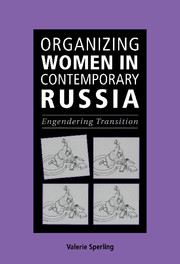Book contents
- Frontmatter
- Contents
- List of tables
- Acknowledgments
- Note on transliteration
- Map
- Introduction
- 1 Russian women's movement groups and activists
- 2 Analyzing social movements
- 3 Feminism, femininity, and sexism: socio-cultural opportunities and obstacles to women's movement organizing
- 4 “Democracy without women is not democracy!”: political opportunities and obstacles to women's movement organizing
- 5 “Unemployment has a woman's face…”: economic opportunities and obstacles to women's movement organizing
- 6 Remembrance of things past: the impact of political history on women's movement organizing
- 7 International influences on the Russian women's movement
- Conclusion
- Appendix
- Selected bibliography
- Index
4 - “Democracy without women is not democracy!”: political opportunities and obstacles to women's movement organizing
Published online by Cambridge University Press: 22 September 2009
- Frontmatter
- Contents
- List of tables
- Acknowledgments
- Note on transliteration
- Map
- Introduction
- 1 Russian women's movement groups and activists
- 2 Analyzing social movements
- 3 Feminism, femininity, and sexism: socio-cultural opportunities and obstacles to women's movement organizing
- 4 “Democracy without women is not democracy!”: political opportunities and obstacles to women's movement organizing
- 5 “Unemployment has a woman's face…”: economic opportunities and obstacles to women's movement organizing
- 6 Remembrance of things past: the impact of political history on women's movement organizing
- 7 International influences on the Russian women's movement
- Conclusion
- Appendix
- Selected bibliography
- Index
Summary
The political situation is the most important thing, even more important than the lack of money. Here, instead of politics, we have antipolitics. It's not clear what will happen. We live on a volcano. Today it's like this. But tomorrow, the Bolsheviks or the radicals could come to power, and everything will fall apart; nothing will happen.
Moscow activist, commenting on obstacles to women's movement organizingThe political transition period in Russia, starting in the late 1980s under Soviet rule and continuing into the mid-1990s, created a multidimensional set of opportunities for the emerging women's movement. Glasnost reduced censorship, and allowed for open discussions of previously unaddressed issues, including discrimination against women in the labor force, lack of women's representation in high political office, and domestic violence. Meanwhile, the shift from Communist Party rule to a more pluralistic regime increased the relative openness of the political system to autonomous social movements, including the women's movement, and moderated the state's repressive character. Indeed, within a few years of the introduction of glasnost and perestroika, large women's conferences were held, independent of state control, and dozens of women's groups had formed, building on women's transformation of consciousness. These organizations raised controversial issues and spoke out publicly in ways that had attracted harsh repression only a decade earlier.
Yet, from their emergence in the late 1980s, the independent women's groups wishing to influence state policy in a feminist direction faced an uphill battle.
- Type
- Chapter
- Information
- Organizing Women in Contemporary RussiaEngendering Transition, pp. 98 - 145Publisher: Cambridge University PressPrint publication year: 1999



